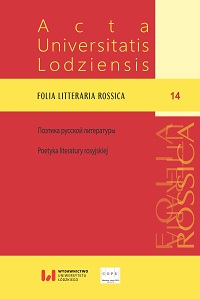О визуально-графических экспериментах в прозаическом тексте (Книшка Поллок. Письмо в четвертой степени)
On Visual and Graphic Experimentation in a Prose Text (Knishka Pollok’s “Writing in the Fourth Degree”)
Author(s): Aleksandr StepanovSubject(s): Literary Texts, Theoretical Linguistics, Studies of Literature, Russian Literature
Published by: Wydawnictwo Uniwersytetu Łódzkiego
Keywords: poetics; paragraphemics; visual and graphic experimentation; prosametrics; contemporary Russian prose
Summary/Abstract: The article examines the poetics of the book "Pis’mo v chetvyortoi stepeni" [Writing in the Fourth Degree], published in 2017 by friends of the late author, the writer and philologist Oleg Gorbachev (1980–2016), who wrote under the pseudonym of Knishka Pollok. The book displays such structural features as non-linearity of the plot, fragmentary narration, combining epic, lyrical and documentary genres, meta- and intertextuality, as well as visual and graphic expressiveness. The present contribution focuses on this last aspect, which manifests itself, in particular, in the use of the $ sign instead of the letter ж [corresponding to the /ʐ/ sound, typically transcribed “zh”] – a device mimicking an imaginary computer error. Another paragraphemic element is the use of italics, which marks parts of another’s (extraneous) text representing the genres of the short story, the letter, or the medical document. An even stronger typographic marker is the use of bold characters to highlight the extraneous poetic text embedded in the writer’s own prose text. Distinguishing between the two types of text is possible only thanks to the font differentiation, the meaning of which becomes apparent to the reader not immediately, but in the process of (re)reading. The essence of the experiment is to notice signals of a stricter, orderly arrangement in the groups of selected words and to impose on the structural code of prose a different code – the poetic one. Such combined forms can legitimately be called “verseprose”. This dynamic combination of prose and verse elements, whereby a new theme is added to the main theme, forming a structural and semantic unity with it, produces what may be called a certain “prosametric” counterpoint. Oleg Gorbachev’s book might be turned into an audiobook, if desired, but then the entire semantic layer created by supragraphemic means would be lost. “Writing in the fourth degree” is an example of experimental prose in which paragraphemics constitute one of the levels on which meaning is generated.
Journal: Acta Universitatis Lodziensis. Folia Litteraria Rossica
- Issue Year: 2021
- Issue No: 14
- Page Range: 261-273
- Page Count: 13
- Language: Russian

